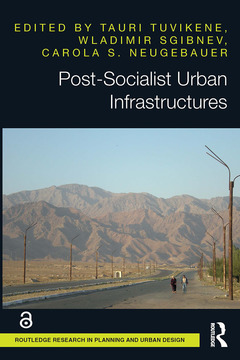Post-Socialist Urban Infrastructures (OPEN ACCESS) Routledge Research in Planning and Urban Design Series
Coordonnateurs : Tuvikene Tauri, Sgibnev Wladimir, Neugebauer Carola S.

Post-Socialist Urban Infrastructures critically elaborates on often forgotten, but some of the most essential, aspects of contemporary urban life, namely infrastructures, and links them to a discussion of post-socialist transformation.
As the skeletons of cities, infrastructures capture the ways in which urban environments are assembled and urban lives unfold. Focusing on post-socialist cities, marked by neoliberalisation, polarisation and hybridity, this book offers new and enriching perspectives on urban infrastructures by centering on the often marginalised aspects of urban research - transport, green spaces, and water and heating provision.
Featuring cases from West and East alike, the book covers examples from Azerbaijan, Bulgaria, Serbia, Croatia, Germany, Russia, Georgia, Lithuania, Poland, the Czech Republic, Tajikistan, and India. It provides original insights into the infrastructural back end of post-socialist cities for scholars, planners and activists interested in urban geography, cultural and social anthropology, and urban studies.
1. Introduction: Linking Post-Socialist and Urban Infrastructures 2. Energy Poverty in Central and Eastern Europe (CEE): Understanding the European Union’s Core-Periphery Divide 3. The Thermodynamics of the Social Contract: Making Infrastructures Visible in the Case of District Heating in Two Towns in Serbia and Croatia 4. Ideologies and Informality in Urban Infrastructure: The Case of Housing in Soviet and Post-Soviet Baku 5. Changing Times, Persistent Inequalities? Patterns of Housing Infrastructure Development in the South Caucasus 6. Post-Soviet ‘Nuclear’ Towns as Multi-Scalar Infrastructures: Relating Sovereignty and Urbanity Through the Perspectives of Visaginas 7. Green Infrastructure in Post-Socialist Cities: Evidence and Experiences from Eastern Germany, Poland and Russia 8. Moscow Urban Development: Neoliberal Urbanism and Green Infrastructures 9. Bengaluru’s Urban Water Infrastructure Through the Lens of Post-Socialism 10. Public Transport in Brno: From Socialist to Post-Socialist Rhythms 11. Predictability and Propinquity on the Sofia Metro: Everyday Metro Journeys and Long-Term Relations of Transport Infrastructuring 12. Infrastructures as Fluidities: How Marshrutkas Help Us to Overcome Static Conceptions of Road-Based Mobility Service Provision 13. Conclusion: Infrastructure and Post-Socialism in Theory and Practice
Tauri Tuvikene is an urban geographer at Tallinn University. His research deals with comparative urbanism in relation to post-socialist cities. He has published on conceptualizations of post-socialism, garage areas in (post-)Soviet urban spaces and urban (transport) infrastructures, including the politics of parking and walking in an urban environment.
Wladimir Sgibnev defended his PhD degree at Humboldt University's Central Asian studies department addressing the social production of space in urban Tajikistan. Currently, he is Senior Researcher at the Leibniz Institute for Regional Geography (Leipzig), working on urban processes in post-Soviet countries, particularly urban development and mobility in peripheralized locations.
Carola S. Neugebauer studied landscape architecture and urban design in Germany and France. She is Associate Professor at the RWTH Aachen University. Taking up an interdisciplinary and comparative stance on cities, her research has been focused on urban transformations, planning and cultural heritage in Central Eastern Europe and the post-Soviet space.
Date de parution : 01-2023
15.6x23.4 cm
Date de parution : 06-2019
15.6x23.4 cm
Thème de Post-Socialist Urban Infrastructures (OPEN ACCESS) :
Mots-clés :
Tamil Nadu; Post-Socialist Urban; Urban Theory; Domestic Energy Deprivation; Post-Socialist; Green Walls; Infrastructure; EU ETS; Green Infrastructure; Integrated Urban Water Management; Neoliberalisation; Polarisation; Post-socialist City; Hybridity; Green Urban Infrastructures; Metropolitan Cities; Energy Poverty; Peripheral Cities; Ria Novosti; Urban Mobilities; Soviet Nuclear Industry; Urban Ecology; Domestic Energy Prices; Medium Machine Building; Cee Member State; Public Private Nexus; Cee Post-socialism; Modern Infrastructural Ideal; Lithuanian Soviet Socialist Republic; Georgian Soviet Socialist Republic; District Heating; Cee Region; Neoliberal Urbanism; Metro Infrastructure; Urban Green Spaces


